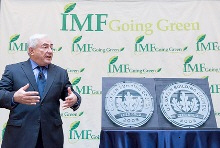
Typical street scene in Santa Ana, El Salvador. (Photo: iStock)
IMF Survey: IMF Wins Environmental Award as Nations Debate Climate Change
December 11, 2009
- IMF is first UN affiliate to obtain LEED gold environmental award
- Measures taken to reduce carbon footprint and conserve natural resources
- IMF will continue to play a role in combating climate change
The IMF was awarded one of the world’s highest environmental designations for its headquarters buildings in Washington, D.C., just as policymakers from around the world convened in Copenhagen for a two-week United Nations conference on climate change in early December.

IMF Managing Director Dominique Strauss-Kahn: “International institutions like the IMF need to play their part” in fighting climate change (photo: IMF)
ENVIRONMENTAL SUSTAINABILITY
The IMF is the first United Nations affiliated organization to obtain gold-level Leadership in Energy and Environmental Design (LEED) certification for existing buildings, a widely recognized seal of approval for green buildings. The award signals that the institution takes seriously its obligation to play a role in combating climate change, the IMF’s Managing Director Dominique Strauss-Kahn said.
“People of the world look to their leaders and institutions to make these difficult decisions and to work together toward the greater good of the planet,” Strauss-Kahn told a gathering of staff and invited guests at the December 4 award ceremony. “International institutions like the IMF need to play their part in contributing to a solution.”
The road to green
LEED certification was developed by the U.S. Green Building Council in 1998 to provide third-party verification of a building’s environmental soundness. To earn credits under the LEED system, an organization must demonstrate that its buildings meet certain standards in the areas of efficient energy use, water conservation, indoor air quality, waste management, and the use of sustainable materials. Both new and existing buildings can be certified.
For the IMF, the first step in pursuing LEED certification was to conduct a complete sustainability assessment of the operations in its two headquarters buildings in early 2008. Once a baseline of environmental performance was established, the Fund could then create a set of measurements for gauging progress toward LEED requirements for existing buildings.
“LEED is really an environmental management system; it helps you frame the components of environmental sustainability and then measure them,” said Mary Beth Kelly, Deputy Chief of the IMF’s Facilities Division.
Since introducing its environmental sustainability program, the IMF has succeeded in:
• decreasing energy usage by 7.2 percent;
• reducing water consumption by 19 percent, or 8.5 million gallons per year;
• recycling 100 percent of its property assets (such as computers) and 49 percent of its general waste;
• purchasing $200,000 in carbon credits to offset emissions created by staff air travel; and
• introducing a program to encourage the use of public transportation for staff commuting
Grassroots effort
Construction on the IMF’s first headquarters building began in 1973, and the second headquarters building was completed in 2005. Gaining LEED credits for an older building involves minor modifications to equipment as well as implementing new policies to align the organization with leading-edge green practices. For example, the IMF now has a procurement policy to purchase products only from suppliers whose products—such as computers, furniture, and all consumables—are certified green.
Pursuing LEED certification for existing buildings is well worth the effort, says Peter Templeton, President of the U.S. Green Building Certification Institute. Buildings are the leading contributors to climate change and natural resource depletion challenges, but they also present a major opportunity, he observed.
“Over 75 percent of the buildings that will exist in most of the planet’s large cities in the year 2050 already exist today. Improving energy efficiency in our existing building stock by only 1 percent would be as effective as making all of our new construction more than 50 percent efficient,” he said.
While the award marks an important milestone for the institution, the work is not over, said Frank Harnischfeger, Director of the IMF’s Technology and General Services Department, noting that a number of IMF staff care deeply about the push to go green. “It’s really a grassroots effort to operate these buildings as effectively and as efficiently as possible every single day.”
Comments on this article should be sent to imfsurvey@imf.org


